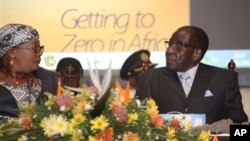HARARE —
A group of Zimbabwean women have issued a call for greater gender equality and women’s empowerment in government.
Resolved to make sure their concerns are taken seriously, the group, led by Zimbabwe Deputy Prime Minister Thokozani Khupe, met Tuesday in Harare to confront the country's unity government.
Khupe, who is also president of GlobalPOWER Women Network Africa, an organization of elected women and appointed representatives that seek to advance gender equality and women's empowerment across the continent, said she would take their message to the Cabinet.
"The voices of women in Zimbabwe must never, never be ignored again," said Khupe. "Because if you look around us here what you find is that poverty wears the face of a woman, hunger wears the face of a woman, disease wears the face of a woman, inequality wears the face of a woman, HIV wears the face of a woman. As women do we really deserve this? The answer is a big no.”
Women from all walks of life — politicians, businesswomen and young people — attended the event, which was sponsored by Joint United Nations Programme on HIV and AIDS.
“What I would want young people of Zimbabwe [to have] is the safe space where they can be able to participate in the developmental process of their country," said Beatrice Savadye, who outlined concerns of Zimbabwean youth. "There are a thousand reasons why young women do not [have] access to resources now. I think poverty and limited access to education are very key in young people failing to access resources, because when you are not educated no one is going to give you a job, you will not know how to run a business.”
Female politicians addressed the group, saying they want 50 percent of parliamentary, Cabinet, and local seats reserved for them in the next election, expected next year under a new constitution. The 15-nation Southern African Development Community has called for all of its members to have 50-50 representation between men and women by 2015.
Khupe urged women at the meeting to make sure their demands are not dismissed as mere talk.
“Days are over where we do what I call N.A.T.O.: No action and talking only," she said. "Busy talking and talking! No talking and talking in business, parliament, in Cabinet, in our meetings. We want action.”
With elections expected by mid-2013 in Zimbabwe, the call for gender equality is expected to gather momentum.




